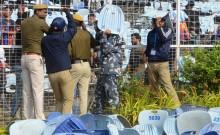
Exposing yet another indifferent attitude of the Manipur government towards the poor in the hilly districts of the state, food items meant for the impoverished in the state have been allowed to siphon off for many years despite complaints and agitations by the public.
According to the record book of the Department of Consumer Affairs, Food & Public Distribution (CAF&PD), there are 54462 ration card holders in the three constituencies of Senapati district - Karong A/C, Mao A/C and Tadubi A/C, out of which 36016 belong to Below the Poverty Line (BPL), 11362 Antyodaya Anna Yojana (AAY) and 7084 Above the Poverty Line (APL). Sadly, not a single ration card has been issued to the deserving poor families in the district.
The CAF&PD official website has also listed 307 Fair Price Shop (FPS) agents and 319 S.K. Oil Dealers in the district but it has remained an illusion. Not a single village Grain Bank exists in the district though the department has listed five such banks in its official website.
Several organisations like Senapati District Consumers' Club (SDCC) and Peoples' Action for Change (PAC) along with other organisations in the district had filed complaints to the state government in connection with the food scam besides organising protests to bring about public awareness but nothing has been done till date.
SDCC claimed that thousands of quintals of rice and other essential food items have been misappropriated by the Department of CAF&PD over the last few years, but the state government is not willing to book the defaulters, and the MLAs of the district - Dr Alexander Pao, Francis Ngajokpa and L Dikho, are keeping mum on the issue.
"Food items like rice, wheat, flour etc. meant for the poor people in the district have been siphoned off. There have been irregularities in the distribution of foodgrains and other essential household items for several months in the last few years," said D. Maryna, President of SDCC.
She said that SDCC has been relentlessly fighting for the cause of the poor in the district despite challenges and threats from several quarters, adding that they will not give up till justice is served.
"We will not give up the fight. If the state (Manipur) government doesn't solve the problem in the district, we will take up the matter to the central government and the Ministry of Consumer Affairs, Food & Public Distribution," said SDCC President.
Senapati district Deputy Commissioner (DC) Pradeep Kumar Jha, who has been posted in the region since 2011, admitted that the people of the district have been deprieved of ration cards, a must-have document to avail the items issued through TPDS. He said rations cards would be issued to the people very soon.
"Ration cards will reach the people in the district within two to three weeks' time. It's not an assurance, it will happen. We are working with the concerned officials to make it happen," said Senapati DC.
When asked about the absence of Fair Price Shops and Grain Banks in villages, which is one of the reasons for misappropriation of food items before reaching the deserving beneficiaries, he assured that everything would be in place soon and that food items have been issued only after approval by village leaders.
Ironically, people of Senapati are still fighting to get their fair share of the scheme at a time when the Congress-led UPA government is trying to pass the ambitious National Food Security Bill, which aims to cover 75 percent of the rural population in the country under TPDS. If the government doesn't clear up the present mess, the Bill could create more mayhem in the district rather than benefiting the people.
With an aim to reduce hunger in the country, the government of India under the Ministry of CAF&PD introduced Targeted Public Distribution System (TPDS) to ensure that the poor get essential commodities like wheat, rice, sugar, and kerosene at a highly subsidized rate.
Under the scheme, Antyodaya families can avail 35 kg of foodgrain per month at a highly subsidized rate - ₹3 (per kg) for rice and ₹2 (per kg) for wheat. BPL families too can avail 35 kg of foodgrain per month but at a slightly higher rate, ie, ₹5.65 (per kg) for rice and ₹4.15 (per kg) for wheat. APL families can avail 25 kg of foodgrain monthly at a subsidized price of ₹8.30 (per kg) for rice and ₹6.10 (per kg) for wheat.
The central government is responsible for procurement, storage and transportation of foodgrains while the state governments hold the responsibility of distributing it to the poor families through Fair Price Shops. Under section 420 of The Indian Penal Code (IPC), defaulters of the scheme meant for the poor are punishable by imprisonment up to seven years along with a fine.












